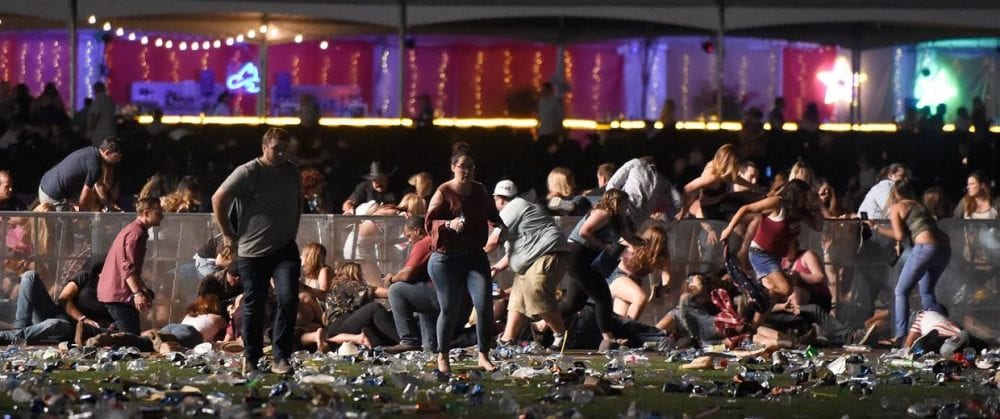Concerts are supposed to be a time of unity and peace, but over the past few years, multiple violent incidents have brought a different type of energy: fear. As gun violence and bombings have made their way into the music scene, concert-goers have had to ask themselves more and more – to go or not to go?
The trend to violence at such events has been rapid and sobering. In 2015, assailants killed 89 people at an Eagles of Death Metal show at the Bataclan club in Paris, part of a series of terrorist attacks in the French city that day. The Pulse nightclub shooting in Orlando saw 49 people lose their lives. A crazed fan with a gun ended the life of singer Christina Grimmie while the onetime Voice contestant was signing autographs outside the Plaza Live. Last year, Manchester England faced a suicide bomber the following year at an Ariana Grande concert, sending the crowd into chaos just as the show ended. Most recently, the Route 91 Harvest festival saw the deadliest mass shooting in history, as a gunman with an arsenal at a nearby hotel left 58 dead and 489 people injured before taking his life as authorities closed in.
Survivors of concert violence spoke out to Pitchfork, explaining how they mourned, fought with emotions, and eventually accepted what happened to them. While some are able to freely go to concerts still, others are left with severe PTSD, nightmares, and overall, a general distaste for live music.
David Fritz Goeppinger is a survivor of the shooting at the Eagles of Death Metal concert in Paris. He was held hostage with a dozen other audience members by terrorists for more than two hours on the Bataclan’s second floor balcony. Although Goeppinger still attends concerts, he doesn’t get the same experience, since the shows are triggers of the awful memories.
“I had been to many concerts before the Bataclan, maybe 100, but I don’t love concerts the same way anymore,” he told Pitchfork. “I still like music, but it’s not the same.”
Patience Carter, a survivor of the shooting at Pulse Night Club, has come to terms with the disaster she faced and still attends events, but after the news of the Las Vegas shooting, she wants nothing to do with big, outdoor concerts.
“If you’re indoors, there may be a chance that somebody at the door is doing their job and that the area is secure,” Carter told Pitchfork. “But when you’re outside, there’s so many other factors that can happen. When you think about possible bombs, or somebody in a window that’s 30 feet away that wants to make a statement about America—when you’re outside, the world can literally be against you.”
The Las Vegas mass shooting is a new concept; terrorists don’t need to necessarily be inside events to target crowds. Steven Adelman, vice president of the Event Safety Alliance, who focuses on promoting safety at live concerts, told MarketWatch more venues are positioning bag checks and screenings further from the entrance to create a greater “buffer zone.” Additionally, lighting is being improved, more advanced security cameras are being placed around venues, and security guards are actively present.
Fear may be a factor when buying concert and festival tickets this year. Just in the U.S., there are dozens of festivals this summer, including Firefly, Lollapalooza, Bonnaroo, Warped Tour, Boston Calling, and Coachella. In light of recent events, there have been mixed sales results.
When early-bird tickets to Warped Tour’s final run went on sale earlier this month, almost all of the tour dates were sold out immediately, crashing ticket sites. Additionally, Coachella weekend passes sold-out within hours. The interest to attend was evident, however, other shows didn’t have the same positive response. According to the Chicago Tribune, four-day passes to Lollapalooza were still available five days after they went on sale; last year, the tickets sold out in under two and a half hours the same day they were released. Platinum passes to Bonnaroo also plummeted, adding to another year of weak sales. Industry executives and consumers chalked up the slow sales to multiple factors, including concert security.
President and Editor-in-Chief of the concert industry publication Pollstar, Gary Bongiovanni, told the Tribune that the heightened awareness of violence at public events has not had a major impact on the festival business. However, fans are still struggling with the decision to attend shows.
Dr. Elana Newman, a professor of psychology at University of Tulsa and the research director for Columbia’s Dart Center for Journalism & Trauma, told Billboard that concertgoers should be aware of the risks, but not let this anxiety keep people from shows.
“I think the reality is that while we don’t live in a 100% safe world, we live in a mostly safe world for most people,” she said. “We have to make judgments, but constricting one’s life because of fears is not a healthy way to live.”
Agreeingly, co-owner of Texas-based promoter C3 Presents, Charles Attal, makes the point that security is always the No. 1 priority, and is a factor that is regularly discussed internally within the industry.
“There are bad things happening all over the world, not just at music events, and you have to address them,” Attal said. “But you also have to live your life.”
Whether or not you plan on attending an upcoming festival or concert this year, safety is on everyone’s minds, but something the survivors all agreed on: continuing to listen to music helps heal the wounds.




